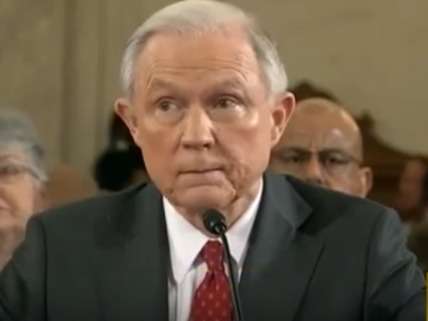Jeff Sessions' Praise for the Cole Marijuana Memo Is Not a Promise of Restraint
The memo leaves plenty of room for a crackdown on the newly legal cannabis industry.

Although it is obvious that Jeff Sessions does not like pot, it is still unclear how that attitude will affect his work as attorney general, nothwithstanding his statement yesterday that the Justice Department's policy regarding state-licensed marijuana suppliers during the Obama administration was largely "valid." Sessions was referring to the 2013 memo in which James Cole, then the deputy attorney general, suggested that such businesses needn't worry about federal prosecution or asset forfeiture as long as they complied with state law and did not impinge upon federal "enforcement priorities." But the Cole memo is highly ambiguous and elastic, so Sessions' semi-endorsement of it should not be read to mean that he has no plans to crack down on the cannabis industry in the eight states that have legalized the drug for recreational use.
"The Cole memorandum set up some policies under President Obama's Department of Justice about how cases should be selected in those states and what would be appropriate for federal prosecution, much of which I think is valid," Sessions told reporters after a speech in Richmond. He added that he "may have some different ideas myself in addition to that" but noted that the Justice Department does not have the resources to take over enforcement of marijuana prohibition from police and prosecutors in states that have opted out of it. "We're not able to go into a state and pick up the work that the police and sheriffs have been doing for decades," he said.
The Huffington Post portrays Sessions' comments as reassuring. Under the headline "Jeff Sessions Suggests a Crackdown Isn't Coming for Legal Weed," reporter Matt Ferner says, "Attorney General Jeff Sessions hates marijuana, but it appears unlikely that he'll send the federal government to war against states that have legalized it." Yet what Sessions said yesterday is essentially the same as what he said at his confirmation hearing in January, where he described "some" of Cole's criteria as "truly valuable in evaluating cases." He tellingly added that "the criticism I think that was legitimate is that they may not have been followed."
The Justice Department's failure to properly implement the Cole memo was the theme of the April 2016 Senate hearing at which Sessions said "the Department of Justice needs to be clear" that "marijuana is not the kind of thing that ought to be legalized." The title of the hearing, which was held by the Senate Caucus on International Narcotics Control, asked, "Is the Department of Justice Adequately Protecting the Public from the Impact of State Recreational Marijuana Legalization?" Sessions clearly did not think it was.
Cole listed eight enforcement priorities, including prevention of interstate smuggling, distribution to minors, and "adverse public health consequences related to marijuana use." Any one of them could easily be cited as a rationale for seriously disrupting the newly legal cannabis industry, if not shutting it down entirely. U.S. attorneys could wreak havoc simply by sending threatening letters to state-licensed cannabusinesses, their landlords, or anyone else who facilitates their federal felonies. The DOJ also could challenge state licensing systems in federal court, arguing that giving an official stamp of approval to marijuana suppliers violates the Controlled Substances Act. Nothing Sessions has said precludes any of that. It all comes down to his interpretation of the Cole memo, which made no promises and left federal prosecutors lots of leeway to target state-legal marijuana businesses.


Show Comments (16)